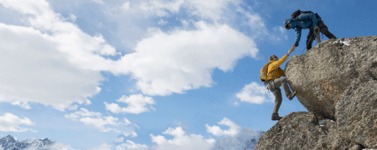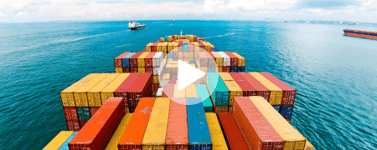Hawksford recently held an event in London where we welcomed motivational speaker Chris Moon to talk to our team about personal resilience. It’s something that he’s fully qualified to talk about, having honed his own resilience the hard way.
Chris is a former British Army Officer who left to work for a charity clearing landmines in Asia and Africa. He survived being taken prisoner in Cambodia by the Khmer Rouge and negotiated his release and that of two colleagues from threatened execution.
In 1995, he was blown up in a supposedly safe area of a minefield in remote East Africa losing an arm and a leg. He survived initially because he treated himself and subsequently recovered three or four times faster than was expected. Chris taught himself to run again and was the world’s first amputee ultra-distance runner. In 1997, he completed the gruelling ‘Marathon de Sables’.
Since then, Chris has become a veteran adviser to the NHS on state of the art prosthetics, was awarded an MBE for his work in demining and in recognition of his humanitarian work and has become a prominent keynote speaker who also runs workshops to improve individual and team performance.
I took the opportunity to speak to him after the event about personal resilience and how important it is when it comes to the workplace.
Gavin Wilkins (GW): Companies often talk about business resilience, but how important do you think personal resilience is, both in navigating life in general and dealing with work stress?
Chris Moon (CM): I think personal resilience is something we don't talk about enough. I don't believe that we, as a society, understand it particularly well. But it’s absolutely essential in order to get through life. I’d say that everyone has a measure of personal resilience, but some clearly have more than others.
We often think about resilience when a crisis happens, being blown up for instance, or getting through a pandemic. But we’re under pressure all the time, be that through work, family, or life in general.
My view is that we have to work at building resilience on an ongoing basis. We only have so much psychological fuel in the tank. When we’re in challenging times, we'll be using reserves, so we have to make sure those reserves are constantly topped up. I think that the whole key to this issue is to find ways to recharge our psychological batteries on the go. And for each of us, that will be different.
.jpeg?width=372&height=700&name=Ultra%20event%20photo%20-%20Chris%20Moon%20MBE%20(1).jpeg) Chris Moon MBE
Chris Moon MBE
GW: Is it hard to develop resilience when we’re under stress a lot of the time?
CM: The first thing we need to recognise is that when we get stressed, we usually don't realise it. And many people perhaps aren't aware when it starts to kick in. A lot of the time there’s a drip, drip, drip of stress. People may be very good at dealing with the sudden floods, the crises, but they have to learn to deal with the drips – all the little stresses that may seem small on their own but soon add up, and lead to a ‘fight, flight, fright’ response.
GW: And how does that typically manifest itself?
CM: People move into a place where they become reactive, rather than proactive. Small things all of a sudden feel a lot larger than they really are and our reactions can become out of proportion with an event. That minor disagreement with a work colleague that all of sudden gets very heated, for instance.
GW: So how do we keep our psychological batteries charged, build resilience, and minimise stress?
CM: I think for many people, it can be really helpful to understand certain techniques. But most importantly there isn’t a silver bullet, you have to find a way that works for you and it’s something that you have to make an effort with every day. There’s no quick win, I’m afraid.
There’s so much negative news at the moment, so for a start we need to be careful about the things we put into our brains and recognise that we need to worry about the things we can control, not the things we can't. If we can't do anything about it, there's very little point in letting it drag us down.
There’s also plenty of evidence to show the benefits of exercise, be that running, swimming, walking the dogs or anything that just gets the blood flowing. Some people speak to or spend time with their family, some people listen to music and chill out. Some people read, while others get out into nature. And socialising can be important as well, humans are social animals at the end of the day.
The problem is that when the drip, drip, drip of stress is happening, these things that charge our psychological batteries are often the first things we stop doing, when in reality, we should absolutely make sure that we commit to them.
GW: In your presentation, you spoke about the importance of starting the day by getting your head in the right place. Does that have real value when it comes to work?
CM: Absolutely. I facilitated a workshop not so long ago with some people who are in very stressful jobs, and we came up with a plan where everybody committed to spend the first 10 minutes of their day getting their head in the right place.
Some people did a bit of exercise, some did yoga, some listened to music. Some read a book for 10 minutes. Some people went for a very quick jog, some people prayed. And for different people, it worked in different ways. But the important thing is when they did that, they found they were in control of their day, and they became more proactive rather than reactive. It's about owning our headspace.
Building these small habits for ourselves and doing it regularly can have a profound effect on how we approach the rest of our day, and that definitely includes how we deal with work stresses, challenges with colleagues, and any crisis that might arise.
GW: 'Thinking beyond tomorrow’ is at the heart of Hawksford's purpose. Chris, that caught your eye earlier and you said it was very poignant from a resilience perspective; what did you mean?
CM: We can become very bogged down by things that have already happened. Likewise, in the middle of a crisis we are focused very much on the here and now. Often, we aren’t enjoying the present as much as we should, but it’s absolutely vital to have things to look forward to.
Whether in life or work, find your reasons to rise above the things that are dragging you down. Life is about making the best of it. It's truly a gift that we're lucky to have, and I should know! Life is full of opportunities and if we approach things with a positive mindset, it can really help drive us forwards.
When it comes to work, it’s important to have the right team around you, working with the right people, trying to eradicate any negativity that can happen in that space. I think it's very important for managers and leaders in the workplace to avoid micromanagement. And I think helping and encouraging and enabling people is so important.
If you work with people who look for solutions rather than problems, you're always going to be in a better place, ready to take on new challenges and be far more resilient.
In other words, thinking beyond tomorrow.

Speak to our experts today
Updated on







